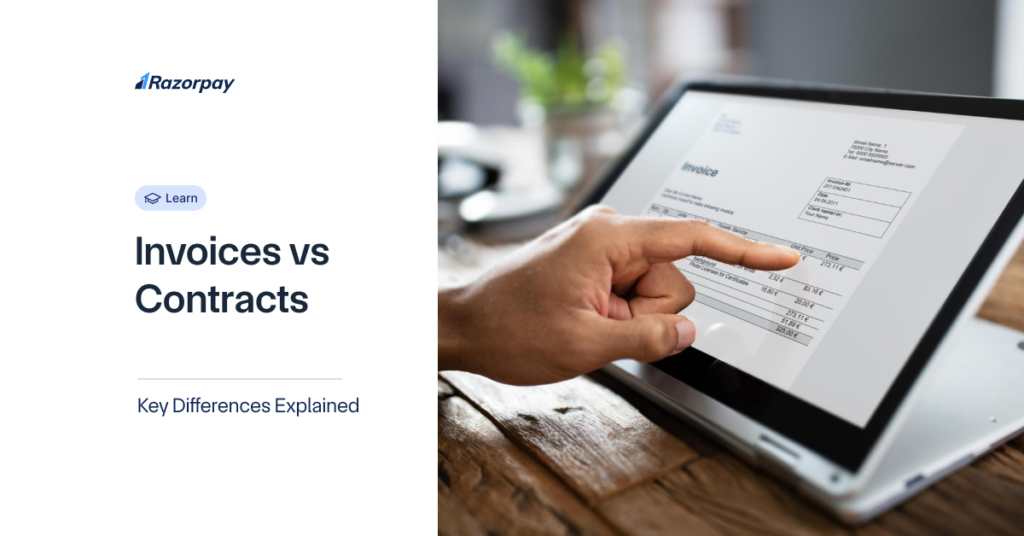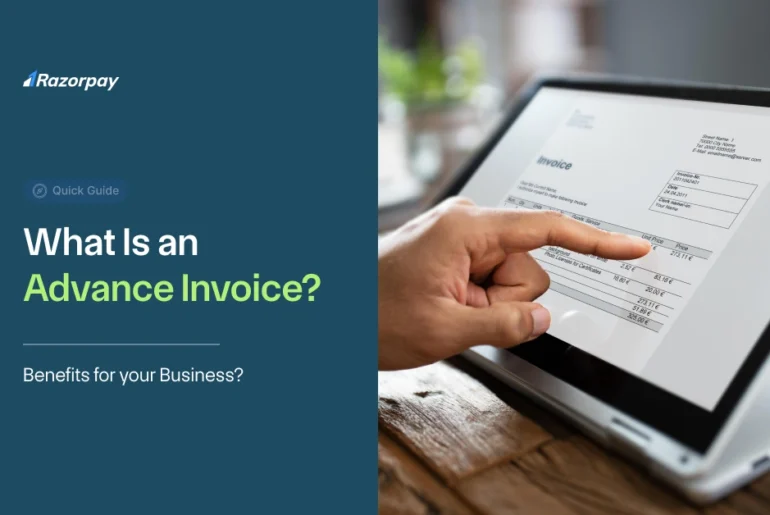Small businesses in India often struggle with paperwork. You need to know the difference between invoice vs contract to protect your business. These documents serve different purposes under India’s Contract Act of 1872 and GST laws. Studies show that 71% of Indian freelancers who work without proper contracts face payment issues. In this article, we will explore what sets these essential business documents apart.
Table of Contents
What Is an Invoice and Its Purpose?
An invoice is a document you send to clients after providing services or goods. It requests payment and includes your business name, contact information, GSTIN, and the client’s details. Every invoice lists what you sold, quantities, prices, taxes, and when payment is due.
Purpose of an Invoice
- Request for Payment: An invoice formally asks the buyer to pay for goods or services.
- Record Keeping: It acts as proof of the transaction for accounting and tax purposes.
- Tax Compliance: In India, invoices are essential for GST filing and compliance.
- Legal Evidence: An invoice can be used as evidence in disputes related to payment or delivery.
What Is a Contract and Its Purpose?
A contract is a legally binding agreement that protects your business interests. When you enter into a contract with clients or vendors, you establish clear terms about what each party must deliver.
Contracts outline specific responsibilities, deadlines, payment schedules, and quality expectations. You’ll need contracts for ongoing services, large projects, partnership agreements, or when significant money is involved.
Purpose of a Contract
- Define Obligations: Contracts specify what each party is required to do.
- Legal Protection: They protect parties from breaches by ensuring enforceable terms.
- Risk Management: Contracts help mitigate risks by clarifying roles, responsibilities, and penalties.
- Business Relationships: They establish trust between parties by formalising agreements.
Key Differences Between Invoice vs Contract
Aspect |
Invoice |
Contract |
|---|---|---|
|
Definition |
A document you send requesting payment. |
A legally binding agreement between you and another party. |
|
Purpose |
To get paid for goods or services delivered. |
To define what each party must do before work begins. |
|
Timing |
Sent after you deliver goods or services. |
Created before any work starts or money changes hands. |
|
Legal status |
Not binding alone, but required for GST compliance. |
Fully enforceable under the Indian Contract Act, 1872. |
|
Tax implications |
Must include GSTIN and follow GST invoice rules. |
No direct tax implic,ations but affects business taxation. |
|
Example |
You bill a client ₹50,000 after completing the website design. |
You agree in writing to design a website for ₹50,000 within two months. |
Legal Aspects of Invoices and Contracts
Under GST laws, your invoices must include your GSTIN, correct HSN/SAC codes, and proper tax breakdowns. While invoices alone aren’t legally binding, they serve as crucial evidence in payment disputes and are essential for tax compliance. Tax authorities can penalise you for incorrect invoicing.
Your contracts must follow the Indian Contract Act requirements—offer, acceptance, consideration, and lawful purpose. Contracts protect you when business relationships go wrong, as courts can enforce them through damages or specific performance orders.
Both documents work together to create a paper trail that protects your business during audits and ensures compliance with Indian tax regulations.
When to Use an Invoice vs a Contract
You’ll use invoices after completing work—like when you deliver products, finish a design project, or provide monthly services. They help you get paid for work already done.
Contracts are essential before you begin larger commitments. You need them when starting construction projects, agreeing to ongoing consulting work, or entering business partnerships where significant money is involved.
For best results, use both together. First, create a contract outlining expectations and terms. Then, follow up with proper invoices as you complete the work phases.
Best Practices for Using Invoices and Contracts
1. Maintain Accuracy and Completeness
Always create accurate documents with complete information. Your invoices should include all GST details, while your contracts need clear deliverables and payment terms.
2. Organise Your Documentation
Keep your paperwork organised—store digital copies of all contracts and invoices in dedicated folders with consistent naming conventions. This helps when you need them for tax filing or if payment disputes arise.
3. Utilise Digital Tools
Consider using digital tools like Zoho Invoice, Quickbooks, or Tally for automated invoicing. For contracts, platforms such as LegalDesk or SignEasy help you create, sign, and store agreements securely. These tools reduce errors, save time, and ensure your business documents meet Indian legal requirements.
Common Mistakes to Avoid
1. Documentation Essentials:
Replace verbal agreements with detailed written contracts. Include complete GSTIN and tax details on invoices to maintain compliance and avoid penalties.
2. Financial Tracking Systems:
Implement procedures to monitor invoices and payment deadlines. Set reminders for outstanding payments and contract renewals to maintain a healthy cash flow.
3. Legal Compliance:
Ensure contracts contain all required legal elements for enforceability. Proper tax calculations and complete invoice fields protect against audits and fines.
Conclusion
Understanding the distinction between invoices and contracts is vital for business success. While contracts establish legal frameworks before work begins, invoices ensure proper payment collection afterward. Using both correctly strengthens legal compliance, improves cash flow, and builds professional relationships. Implement digital tools and best practices to manage these documents effectively and protect your business interests.
Frequently Asked Questions (FAQs)
1. Can an invoice replace a contract?
No, an invoice cannot replace a contract because it does not define obligations or protect against breaches.
2. Is an invoice legally binding?
An invoice is not inherently legally binding unless linked to a contract or purchase order that defines obligations.
3. Do I need both an invoice and a contract for the same transaction?
Yes, especially in high-value transactions where contracts formalise terms while invoices request payment post-delivery.
4. What happens if a client refuses to pay an invoice without a contract?
Without a contract, enforcing payment becomes difficult as there is no legal agreement defining obligations.
5. Can a handwritten contract be legally binding in India?
Yes, handwritten contracts are legally binding if they meet the requirements of the Indian Contract Act (offer, acceptance, lawful consideration).
6. Can you send an invoice without a contract?
Yes, invoices can be sent without contracts for routine transactions like retail sales or small-scale services; however, contracts are recommended for high-value dealings.



